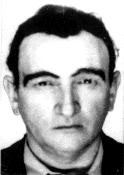

But if the death was natural, how do we explain two "suicide notes" that were found in Ferrie's apartment at the time of his death? The first of the notes reads as follows:
To leave this life is, for me, a sweet prospect. I find nothing in it that is desirable, and on the other hand everything that is loathsome.As researcher Barb Junkkarinen points out, this doesn't really sound like a suicide note at all, but rather like a letter to the editor, editorial, or essay. David Blackburst points out that the letter seems to reflect Ferrie's own legal troubles between August 1961 and late 1962. "He refers in the letter to Judge Cocke, with whom he had difficulties. Ferrie felt that he had been singled out for a shakedown" notes Blackburst.Daily we are propagandized more and more about a rising crime rate. But how do we know it is true? We don't, for we Americans have little or no access to the truth. Today I went to the police headquarters to see these "public records" of this rising crime rate and nearly wound up in jail for my trouble. I was searched, interrogated, verbally abused, had my record checked, and finally threatened. Needless to say, I did not see the "public records."
Still more irking is to hear a superintendent of police, who rose through the ranks (thus proving that zero equals super zero) stating that the solution to the crime problem was tightened and more stringent laws. A somewhat messianic district attorney concurred. Together these men prove themselves utterly unfit for office, just as they proved that an electorate cannot be depended on to pick the right man. The problems of crime rest deep in society. The problems exist in the existence of divorce and the absence of regulations.
No parents would send him [sic] child to an amateur for dental work, nor a quack for an appendectomy. Yet what atrocious negligence is permitting other amateurs to raise children. Mere kids are allowed to marry because they have the "urge". How stupid can you get? Every expert tells in detail how children must be cared for physically, emotionally and intellectually. Yet society lets girls and boys, not yet capable of lover [sic] begat [sic] children who, love-starved, turn to crime for some sort of identification. However, I don't think we will often see a district attorney or a police chief with brains to realize this.
We pay so much attention to the law. I have not figured out the reason. I have watched judges like Cocke at work. The various police and district attorneys and the like get to bend the judge's ear long before the trial. These judges of today deny defendants due process of the law. They permit the court to try the case in chambers, to have district attorneys form their opinions and decisions long before the defense gets a chance. Further, these same judges (and I am afraid it pertains to nearly all of them) then comment, by word, glance, gesture or remark, on the evidence in front of a jury. If the defendant wins, these judges take it as a personal insult.
When I was a boy my father preached that in the "American way of life" you are innocent till proven guilty. No greater lie has been told. The man charged before the court has flat got to prove his innocence. Go witness a criminal trial and watch. The state is supposed to prove guilt beyond a reasonable doubt. If you read decisions of the various courts of appeal and the Supreme Court you discover that truth and falsehood, right and wrong have no place in court. All the state needs is "evidence to support a conviction". If this is justice, then justice be damned.
The next "suicide note," however, does sound like a suicide note:
Dear Al:Blackburst notes that the content makes clear that "Al" is Al Beauboeuf, Ferrie's dearest friend. Carol was Beauboeuf's girlfriend. She had a poor opinion of Ferrie, while Ferrie was unhappy about the attention Beauboeuf was giving her.When you read this I will be quite dead and no answer will be possible. I wonder how you are going to justify things.
Tell me you treated me as you did because I was the one who always got you in trouble. The police arrest. The strip car charge. The deal at Kohn School. Flying Barragona in the Beech.
Well, I guess that helps ease your conscience, even if it is not the truth. All I can say is that I offered you love, and the best I could. All I got in return in the end was a kick in the teeth. Thus I die alone and unloved.
You would not even straighten out Carol about me, though this started when you were going steady.
I wonder what your last days and hours are going to be like. As you sowed, so shall you reap.
So what are the logical possibilities as to how Ferrie died?
But one key piece of evidence was discovered by Blackburst in Garrison's own files. A bottle of Proloid tablets was found in Ferrie's apartment after his death, and it had seven tablets left in it. Why wouldn't somebody intent on suicide take the whole bottle?
Most likely, Garrison simply lucked out when Ferrie died the natural death the autopsy results showed.